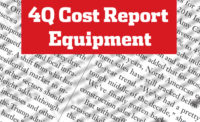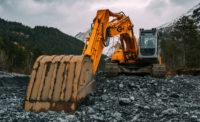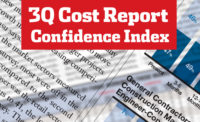Despite being synonymous with visual clarity, the year 2020 approaches with a somewhat blurry outlook for construction equipment purchases. Industry observers agree that domestic and global uncertainties will sap momentum from the decade-long construction boom, but effects on the equipment sector are only slowly coming into focus.
Several manufacturers have pared back 2020 forecasts that already hinted at a slowdown. In November, Deere & Co. predicted a 10% to 15% drop in its construction and forestry sales in its coming fiscal year, while announcements from both Terex and Caterpillar anticipate fourth-quarter 2019 decreases of as much as 10%. Expectations of diminishing demand for equipment also have begun to translate into layoffs, with both Deere and Caterpillar announcing plans to trim production staffs at several domestic manufacturing plants.
Still, the overall health of the U.S. economy may help provide some balm for trends that in other years might be considered downright gloomy. Association of Equipment Manufacturers President Dennis Slater notes that while the optimism of recent years has evaporated, forecasts from the group’s economic partner, Oxford Economics, indicate the construction equipment sector will finish 2019 up 3.9%, “which is positive but a slowdown from 12% in 2018.”
Slater adds that “informal snapshot surveys” of AEM members have found “overall indications of stability to slight growth in 2019 as well as in 2020, although there is little consensus.”
Market analyst Chuck Yengst says that while projects already underway or with investment will continue in 2020, “it’s the new projects coming on line that may be delayed.” He adds that the 2017 tax reform measure “still has staying power to help people who want to buy equipment.”
|
Related Link |
State-funded road and bridge activity is also keeping contractors busy, and, at least in some cases, in the market for new equipment. “Most dealers feel the first two quarters will be good,” says Brian McGuire, president and CEO of Associated Equipment Distributors. Beyond that is anyone’s guess, he adds, “but most believe that we won’t walk off a cliff.”
In some respects, a slowdown in equipment sales is a natural outcome following a year when many categories outperformed expectations.
“Growth has been particularly strong in the mini excavator, telescopic handler and compact tracked loader categories,” says Chris Sleight of U.K.-based marketing consultant Off-Highway Research. “To some extent, they have replaced traditional machines such as tractor loader backhoes and skid-steer loaders.”
The year has also been good for Class 8 trucks, which enjoyed near record-setting sales, according to Steve Tam, vice president of ACT Research. Only 2006 results were better. “Equipment products are the best we’ve ever seen,” Tam says. “Fuel efficiency is at an all-time high, and features like automatic transmission help widen the driver pool.” Following so many big sales years, Tam adds, forecasts of a 15% drop in 2020 shouldn’t be unexpected. “It’s a slowdown to ‘normal,’ which isn’t bad,” he says.
Nevertheless, market certainty may be in short supply in 2020, with multiple unresolved international trade issues, a contentious political landscape and elections on the horizon.
While the likelihood of a federal infrastructure bill materializing in the next 12 months is remote, observers say recent progress toward a new North American trade deal could be a harbinger of hope on other fronts.
Sleight expects equipment sales volumes to “stabilize at a high level or show a gentle decline from 2019 levels.” Noting “a very clear need for infrastructure investment in the US,” he adds that funding “could be a significant driver of further growth in the equipment market.”
Industry caution related to making purchases may bode well for rental companies. United Rentals’ third-quarter earnings report cited strong results market-wide, particularly in the non-residential segment, with a 41% year-over-year revenue increase from used equipment sales. U.K.-based Ashtead, parent company of Sunbelt Rentals, announced in September a $1-billion investment to expand its American fleet and expressed confidence in the market’s medium-term outlook.
McGuire says even a bland outlook for 2020 is better than the alternative. “We still remember the Great Recession,” he says. “The attitude is, if we made it through that, anything else by comparison isn’t so bad.”





